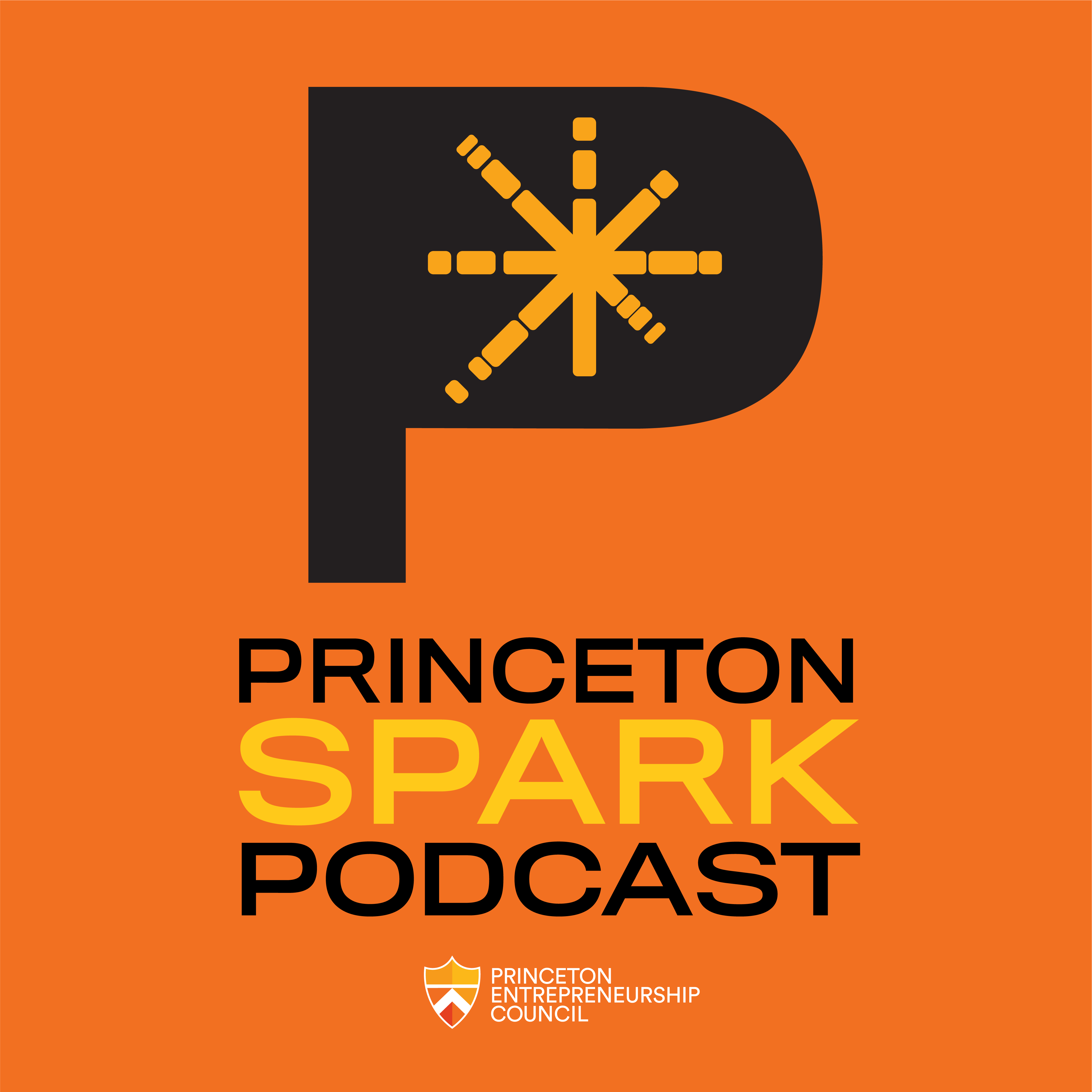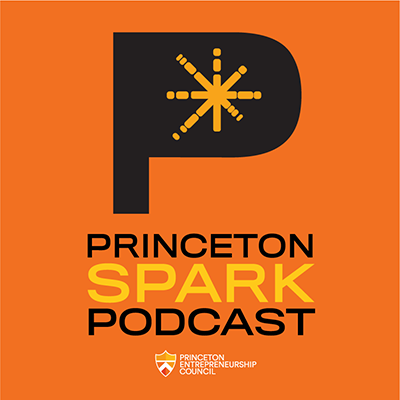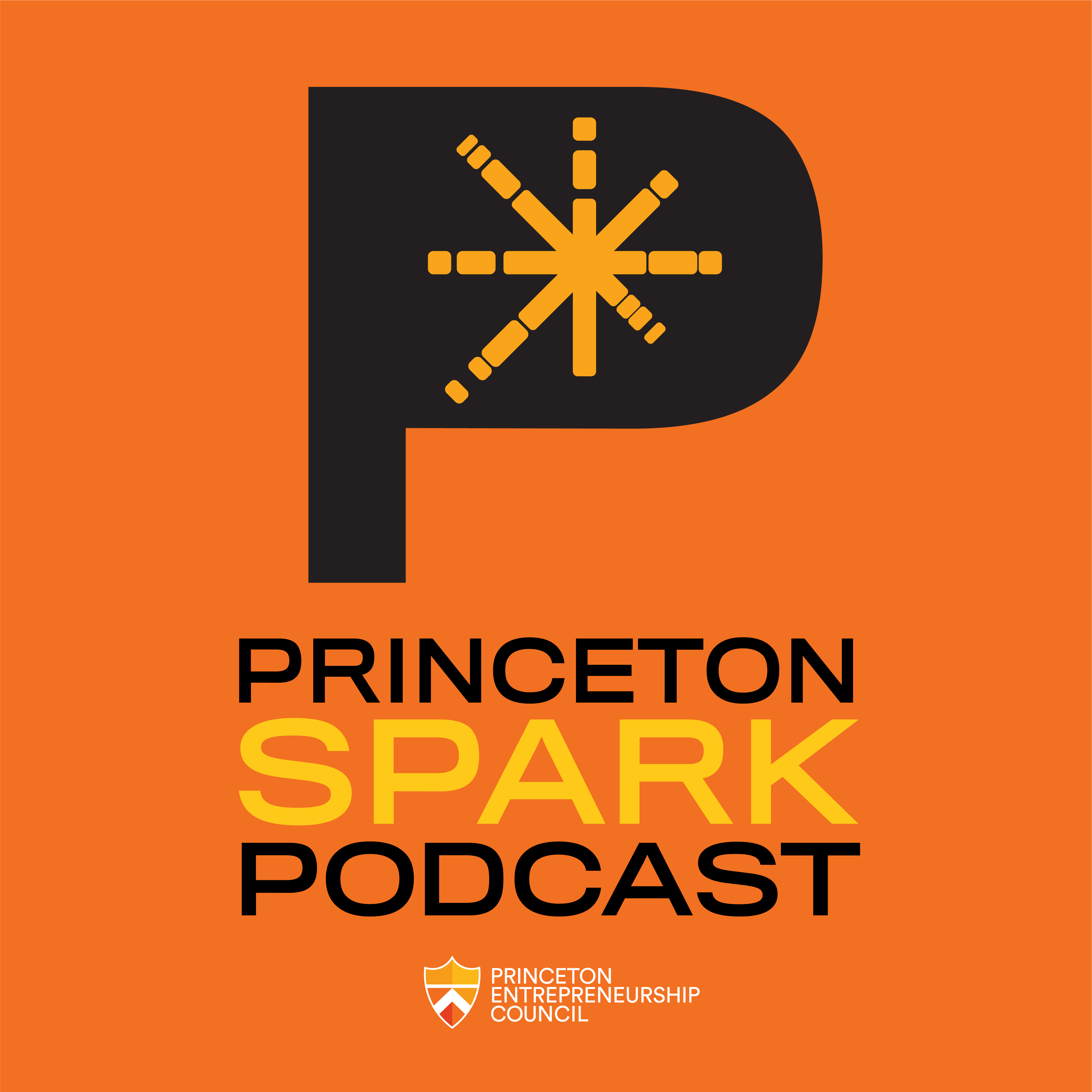Episode 003 - Persisting Through Failure
Description
Persisting Through Failure with Stuart Ahlum '13, Vaidhy Murti '15 and Pilar Castro-Kiltz '10
SHOW NOTES:
Check out Thousand Fell's circular and sustainable sneakers at thousandfell.com. Early mailing list subscribers will have access to Thousand Fell's first 1000 pairs!
Check out Friendsy at friendsyapp.com and Wit at getwit.app.
Check out Princeton Arts Alumni at ptonartsalumni.org and More Canvas Consulting at morecanvas.com.
CREDITS:
Produced by the Princeton Entrepreneurship Council. Music by Wright Seneres. Theme music by the Treadmills (Wright Seneres, electric guitar and electric bass; John Damond, Jr., drums). Engineered by Dan Kearns and Dan Quiyu at the Princeton Broadcast Center. Edited and mixed by Wright Seneres. Promotional readings by Megan Donahey '20.
TRANSCRIPT:
From the Princeton Entrepreneurship Council, this is the Princeton Spark. I’m Wright Seneres.
The various people that make up the Princeton entrepreneurial and innovation ecosystem have long been at work, taking risks to bring transformational ideas and companies to the world, in the Nation’s Service and the Service of Humanity. These are the stories of Entrepreneurship the Princeton Way.
At PEC, we support Princeton-connected startups and help to build the regional entrepreneurial ecosystem in New Jersey and beyond.
In our series-opening three episodes, we are exploring three important aspects of entrepreneurship. If you haven’t heard the first episode on taking risks, or the second episode on thriving under uncertainty, they are available now at princetonspark.com or wherever you get your podcasts, so please check them out.
It’s a widely held notion that most startups fail. Depending on whom you ask, it’s somewhere between 50 to 90 percent. That’s a lot.
But it’s also a common phrase that investors like to back the jockey, not the horse. That is to say, the person and team executing the idea can be more important than the idea itself.
In this episode of the Princeton Spark, we will talk to entrepreneurs who quote-unquote failed in their first startups. They got back on the entrepreneurial horse, and now are on to their next startups and endeavors. We’ll explore how they persisted through failure, on their way to success.
Our first one today is Stuart Ahlum.
My name is Stuart Ahlum, I’m Princeton class of 2013. I’m an entrepreneur, and I run a company called Thousand Fell.
Stuart is the co-founder of Thousand Fell, a completely circular and sustainable sneaker company. His first startup, a sneaker company called House of Future, received an investment from the Princeton Alumni Entrepreneurs Fund in 2017. Normally, after funding from Princeton in the form of AEF, a company would be on their way.
Fast forward a year, and Stuart wound up leaving House of Future. During our interview, he wasn’t able to get into the specifics of why he left. But more importantly, he could talk about what he learned from the process.
I think when you're in it, and when things aren't going well, it feels like an epic failure. And it's hard to separate yourself, you're so close to these projects, you're pouring all of your time and energy into it. And it's hard to take a step back. I think what I've learned is when I've kind of cleared those hurdles, and finished with projects, we've finished with companies, and had an opportunity to sort of really decompress and figure out what I've learned. It's just fantastic learning opportunities. And you're able to kind of pick up a really important set of skills along the way and really build or rather fill, sort of, gaps in your professional skill set. And a lot of those failures help you realize what you didn't know and help you realize what you need next time around, what you immediately need to get off the ground.
That next time around, he was ready.
When I went to start this current company that I'm running, the first thing I did was I went out and I pinged the best of the best that I knew. I built a board of advisors very early on, that knew a lot more about certain parts of either retail or footwear-making or fundraising that I did. So I surrounded myself with the smartest people that I knew, the most capable to help us build this company. And so I sort of was able to hedge my bets and where I wasn't quite as strong. I think in the startup world failure is kind of like a badge of honor in many ways. And so many great, t here's there are some fantastic and super successful first time founders. And there are some men and women that hit it out of the park the first time around. But a lot of really big successful companies and great founders have had previous failures. And I think it's how you learn from them. I can't stress this enough. And I feel like I'm parroting what a lot of people say in the industry. But startups are about constantly putting out fires and things that aren't going well. It’s an incredible emotional rollercoaster of highs and lows. And I think oftentimes more lows and highs when you first start out. And it's people telling you no, all the time, especially when it comes to fundraising. It's exhausting. But if you can get through that, and you can change your mindset, where it's another, like data point, another bit of feedback that allows you to then sort of better inform what you're doing go forward. It's incredibly valuable. And it can’t be taken personally.
How did he actually persist through it?
I took about four weeks off, or maybe six weeks off, and was really trying to figure out what I wanted to do. And I think I mentioned I was initially just going to jump right into something, going to business school. And the idea being I had given it given it a good try with startups, and maybe jumping into business school would allow me to pivot to something bigger, or provide me sort of, again, those gaps, you know, professional skill set that I needed. But I had this idea that drew on a lot of the experience that I had from the previous company, but was again, like completely different and very new. And was really excited by the idea.
Not letting go of an idea. Another spark that can ignite an entrepreneurial journey.
Kind of through that process, stepping away from the company took me about three months to wind things down financially, to hand over responsibility and, and kind of conditionally left at the end of May. And then
WS: May of 2018?
Yes, May of 2018. And during that time, I was working pretty closely with my current co-founder, also my girlfriend, Chloe, who’s co-founder here on Thousand Fell with me. If she was here, she could jump in and give you her background a little bit better than I could. But a lot of those conversations stemmed from what Gap was doing with Aro, their innovation lab. And we realize that we're really on the precipice of biofabrication, cellular agriculture, chemical recycling, there's just so much that's happening, kind of at the forefront there. And we realized, we think that there's enough material innovation out there now, to really apply this to the product that we know best, which is footwear. We should give this a shot, we should try to really make this something circular and something that's sustainable.
Stuart and Chloe built the best network of product designers, branding agencies, sales production teams they could find, brought them together, and now, Thousand Fell is launching in October of 2019. You can read about the completely circular and sustainable life cycle of the Thousand Fell sneaker at thousandfell.com.
After the break, we return to our conversation with Vaidhy Murti. Vaidhy co-founded Friendsy, which occupied some dizzying heights in the matchmaking space. You can hear him in Episode 1, so if you haven’t had a chance to listen, we’ll wait here while you do that. When we come back after this short break, we’ll learn how he felt when it was time to say goodbye to Friendsy.
Welcome back to the Princeton Spark. Failure is a rich topic for discussion in the startup world. Right this second, somewhere in the world, a startup has failed. Probably. Here is what Vaidhy Murti thinks of what the end of Friendsy was like.
WS: And the term itself could be a loaded term. Do you characterize the end of Friendsy a failure?
What a great question. What a great loaded question.
WS: Yeah, take that as you will.
Okay, so if you would ask me, In the first year, or a year and a half, if I characterize it as failure, I would have said yes. And that's probably because society conventionally defines, what happened to us as failure, right? The media writes about all these companies, specifically founders who've managed to, like, you know, build, like this huge viral success overnight, or, like, hit it out of the park, and like, sell their company at like a 10x, 100x multiple of what, you know, they were invested in at. And when you like, look at it in that frame of mind, that's how I was looking at it when it happened. I definitely felt, you know, really, really bad about it. And I felt, you know, super upset that like, I wasn't able to return money on investment. We weren't able to return money on like our investment. So in a financial sense, yeah, it was a financial failure.
And I think, you know, I worked, I talked to a lot of people over that time period, wh










